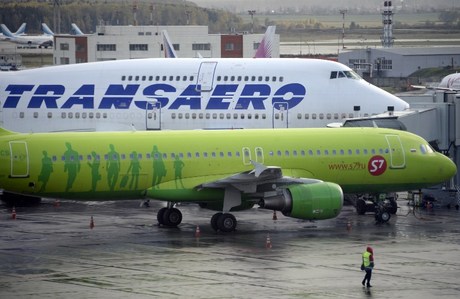Ukraine and Russia Ground Direct Flights in Latest Spat

Direct flights between Ukraine and Russia were grounded Sunday as mistrust between the ex-Soviet neighbors boiled over into a new trade war that affects tens of thousands of families.
"I never thought it would come to this," said 30-year-old Muscovite Alexander Mikhaylin after walking off the very last Russian flight into Kiev's Boryspil airport late Saturday.
"Of course it will make life more difficult," the IT specialist said while still wearily clutching his red Russian passport after passing the customs zone.
"These were the cheapest and most convenient tickets," he sighed.
Russia and Ukraine share a long history and a fierce animosity sparked by months of protests in winter 2013-2014 that ousted Kremlin-backed president Viktor Yanukovych and brought a strongly pro-Western leadership to power.
Ukraine's decision to escape Moscow's orbit set off a bloody chain of events that included Russia's March 2014 seizure of Crimea and the 18-month-long eastern separatist conflict that has claimed at least 8,000 lives.
Russian President Vladimir Putin denies choreographing the eastern revolt in reprisal for the change of heart in Ukraine -- a key component of Moscow's dream of leading a new bloc of regional nations that could rival the European Union and NATO.
But Kiev and its Western allies have challenged that denial because Putin had also at first denied that Russian forces had been dispatched to take over the Crimean peninsula.
He later admitted on Russian state television that the entire Black Sea operation had been well planned in advance.
The veteran Kremlin leader's tough approach to his western neighbor and apparent expansionist dreams triggered a global trade war that saw Russia ban the import of most Western food in response to their sanctions against Moscow.
The most painful sanctions by Brussels and Washington impose partial bans on investments in Russia's vital energy industry.
- Political 'madness' -
The latest spat over flights started with current President Petro Poroshenko's September 16 announcement that Russian airlines would soon be barred from landing -- but not flying over -- Ukraine because of Moscow's refusal to hand back the strategic Crimea peninsula.
Russia denounced the decision as "madness" before taking similar measures this month.
A desperate round of negotiations between the two sides in Brussels on Friday ended with Kiev's rejection of Moscow's demand to stop imposing fines on Russian airlines that still fly to Crimea in a bid to keep tourism there alive.
Authorities estimate that around 100,000 people fly between Ukraine and Russia on average every month.
They also say that at least 70 percent are Ukrainians trying to visit Russian relatives and that it was Kiev's main airline that was likely to be financially hurt the most.
"Another brilliant example of the Ukrainian authorities fighting their own people," Russian Prime Minister Dmitry Medvedev wrote on his Facebook page.
"Strong move!" Medvedev sarcastically added.
Travelers must now look into less convenient and much more expensive options that include overnight trains and flights via other countries on relatively good terms with both sides.
Ukrainians could go west to Moldova before making the longer flight back across their own country to Russia.
Other options include Belarus -- its main airport in Minsk now standing largely empty because of the country's poor relations with the West -- as well as ex-Soviet Georgia.
Travelers could also potentially use the three Baltic countries and their sleek new airports.
But those tiny ex-Soviet nations are proud members of the European Union's Schengen free travel zone.
People without such a visa are required to stay cooped up -- often for many hours -- in the grim waiting areas because they cannot legally leave the airports.
Schengen visas require a difficult registration and screening process that ends with denials in cases when people fail to prove they have no intention of staying in the European Union and have the financial means to fend for themselves.
"I used to visit Russia two or three times a year," Kiev public relations worker Olga Fedorchenko told AFP.
"Now, I only see myself going once a year at the most."



